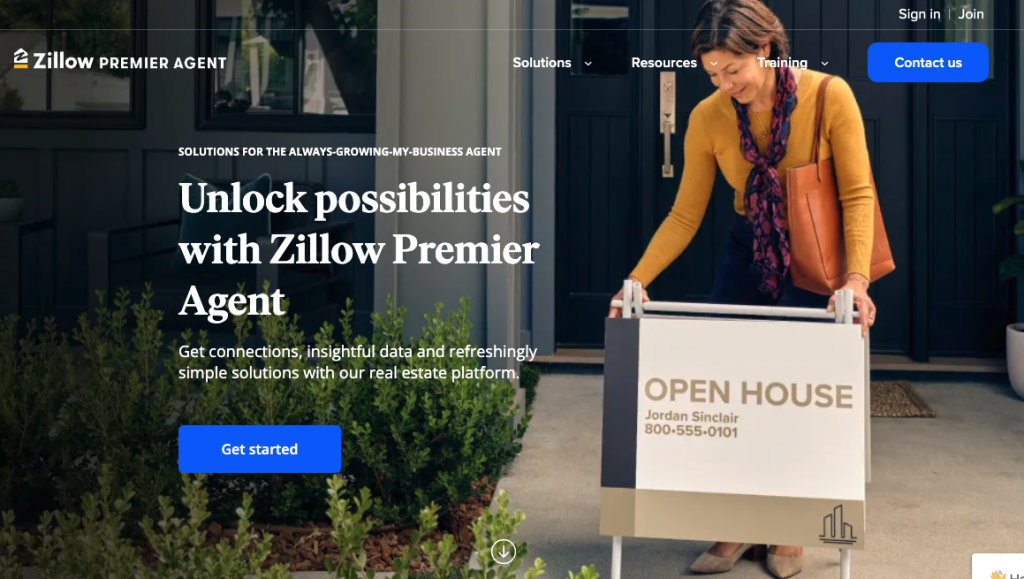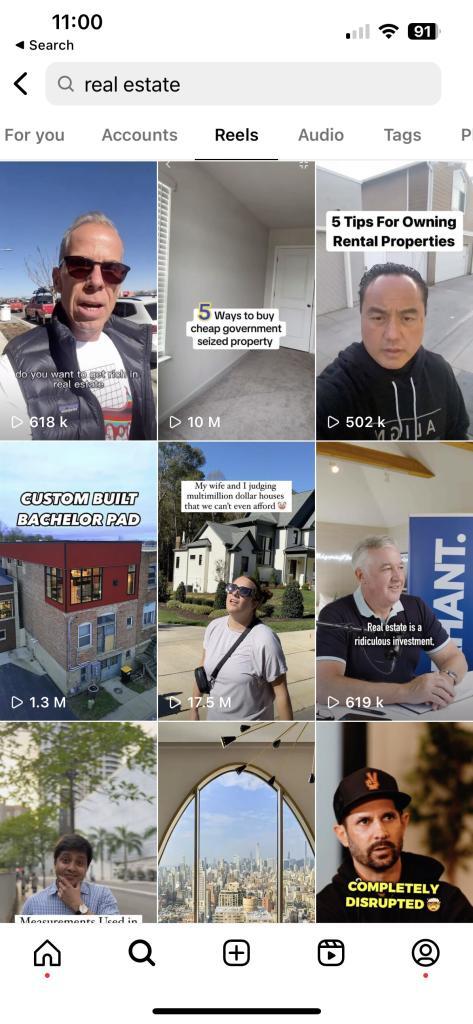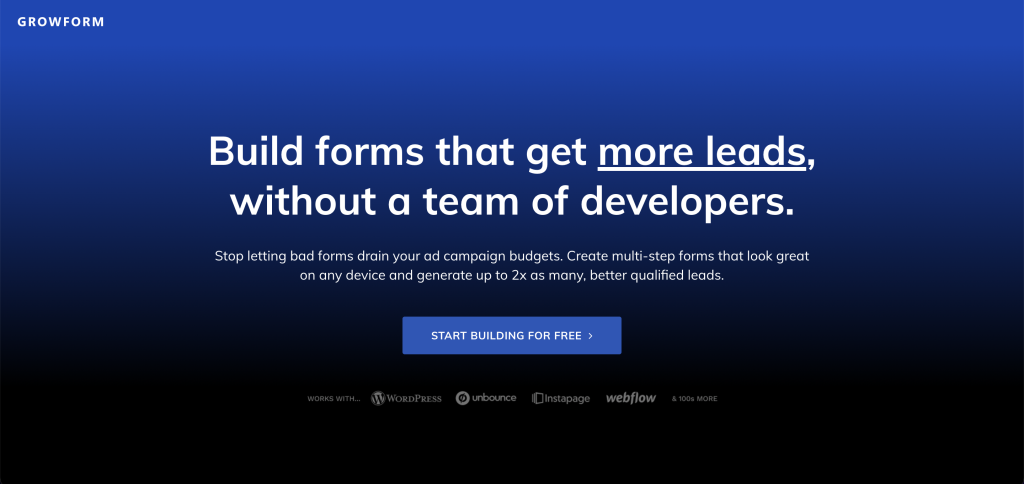As the real estate market continues to experience economic ripples, agents are finding that traditional lead generation techniques need to be adapted to the current climate. With fluctuating interest rates causing uncertainty, realtors must pivot their strategies to stay ahead in 2024.
In this guide, we’ll walk through 15 modern real estate lead generation ideas that align with the current real estate market conditions. We’ll cover tips both new and old, from Facebook Ads to buying leads. Let’s explore how to turn market challenges into opportunities for lead generation in the real estate sector.
The tips:
Table of Contents
1. Get Found With Local SEO
When it comes to real estate lead generation, enhancing your online presence for local searches is a crucial step. You want people searching for properties or real estate services to see your result first, right?
To get started, ensure your business details are consistent across all online platforms. You’d be surprised how many real estate agents have varying details across their website and social media profiles. This includes your agency’s name, address, and phone number – the vital details. Consistency in these details show search engines like Google that you’re trustworthy, improving your visibility in search results.
Next, let’s talk about claiming your business on Google My Business. If you haven’t already, you’re missing a significant opportunity. This free tool allows you to manage how your real estate agency appears on Google Maps and in search results.

Fully complete your profile – business hours, a descriptive and catchy summary, and photos of properties or your team. Profiles rich in details and customer reviews tend to outrank those that are sparse or incomplete.
Your Google My Business profile is a powerful asset in attracting more real estate leads, so don’t overlook it!
Moving to your website, it’s crucial to integrate local keywords. Tools like Google Keyword Planner can provide popular keyword ideas. For instance, if your agency is in New York, you might create pages including phrases like “property listings in Manhattan” or “New Jersey estate agents.”
Think from the perspective of potential clients: what would they search for? These keywords should be woven into your website’s content marketing, meta tags, and blog posts to boost your online visibility.
A pro tip: if you cover multiple areas, you should be creating location-specific landing pages. For example, if you’re an estate agent serving both The Bronx and Brooklyn, having dedicated pages for each area with local information and keywords will provide better results and more real estate leads.
It’s vital to ensure each page offers valuable, relevant information to your clients, rather than just being filler content. Add authentic pictures and local information to your pages to make them appealing to visitors (and therefore search engines!)
2. Redesign Your Landing Page
Real Estate Landing Pages
Having a high-performing landing page is vital to real estate agent lead generation. In fact, the success of almost every other tactic mentioned in this list depends on it.

To transform your site from a basic informational page into a dynamic lead magnet, prioritise conversion rate optimization (CRO):
Revamp your landing page with compelling copy, clear advantages, and distinct calls-to-action (CTA). Your headline and subheadline should immediately grab attention and directly address the needs of potential clients.
Replace a bland “Leading Real Estate Services” with something more engaging like “Find Your Dream Home with Our Expertise”.
Visuals play a critical role, too.
Highlight your successful property sales or showcase your team at work. Where possible, use authentic photos of satisfied clients or properties you’ve successfully dealt with, as these resonate more than generic images. If nothing else, use images of local properties or landmarks rather than bland, universal stock photos.
In your website copy, focus on the benefits, not just the features. Shift from phrases like “We offer comprehensive real estate services” to “Navigate the property market with ease with our comprehensive services.”
Your call-to-action (CTA) is crucial – make it prominent, compelling, and easy to find. An inviting CTA like “Book Your Free Property Viewing Today!” creates urgency and highlights a clear benefit, encouraging visitors to act, which will lead to more real estate leads.
Streamline your lead generation form. An engaging, multi-step form can help you capture significantly more leads, and can easily be added to your landing page with a tool like Growform.
Real Estate Landing Page Examples
Never underestimate the power of social proof such as client testimonials and partner logos. These elements foster trust and should be prominently displayed on your landing page. Showcasing client reviews and recognisable partner logos can instil confidence in potential clients, further improving your real estate landing page’s conversion rate.
Lastly, ensure your site is mobile-friendly. With more people browsing on phones, a mobile-optimised landing page is essential for a seamless user experience and will secure more leads.
3. Run Facebook Ads
Real Estate Facebook Ads
Facebook Ads can be a great way to target people thinking about selling their homes and spur them into action.
Kick off with an attractive offer in your campaign. Perhaps it’s a free property valuation or a reduced commission rate for early sign-ups. The offer should be the highlight of your ad and your landing page. It’s an effective way to catch attention, and you can tweak it later depending on how your campaign is doing.
Try out various ad designs to find out what clicks with your audience. Play around with your images, ad text, and layout. The goal is to discover that perfect combination that attracts potential clients.
Using psychological strategies can be very effective in ads. Implement a sense of urgency or exclusivity, like “Limited time free property valuation” to prompt swift responses. Just make sure these offers are genuine!

If you’re just starting with Facebook ads, consider targeting potential clients in your area using interest targeting, focusing on those likely interested in buying or selling property.
When crafting your ads, ensure your message is tailored to your audience. If you’re focusing on individual clients, highlight how you can help find their dream home or sell their property effortlessly. For businesses, stress your expertise in finding the right commercial space and aiding in long-term investment strategies. Keep your message relevant and engaging!
As you collect more leads, use this data to create lookalike audiences. This powerful feature enables you to reach potential clients similar to those who have already expressed interest in your services, making your targeting more efficient.
Real Estate Facebook Ad Examples
Don’t overlook the Facebook Ads Library. It’s full of active ads, offering valuable insights from real estate agents that have been successful driving leads over time.
4. Partner with Local Organizations
Forming partnerships with local businesses and organizations is a useful strategy for real estate lead generation. Focus on entities that complement your real estate services.
For residential real estate, team up with home improvement businesses, interior designers, or local furniture stores. These partners often meet potential home buyers or sellers who could use your services. Joint events or special deals for referrals can help cultivate these relationships.
In commercial real estate, collaborate with local business chambers or commercial contractors. They frequently engage with businesses needing property space, opening opportunities for your expertise. Engage in networking events or offer free market analysis sessions to establish yourself in the commercial market.
5. Try Google Ads PPC
In the world of real estate agent lead generation, it’s vital to consider pay-per-click (PPC) advertising. This approach allows you to pay only when someone clicks on your adverts on search engines, such as Google. This makes PPC both cost-effective and targeted, provided it’s managed effectively.
Start with thorough keyword research. Utilise tools like Google’s Keyword Planner to pinpoint keywords that align with your real estate offerings and are commonly used by potential clients searching for properties or real estate services.

After identifying your relevant keywords, place bids on them. This ensures that your adverts appear prominently in search results for queries related to these keywords.
Managing your PPC campaigns efficiently is crucial. Regularly monitor your click-through rates (CTRs) and conversion rates (CRs). These metrics offer valuable insights into how well your campaign is performing.
Be ready to tweak your bids and refine your ad copy to boost the campaign’s effectiveness. This might involve changing the language to better appeal to your target audience or adjusting your bids to stay competitive.
Effective lead generation in real estate requires proactive management and ongoing optimization. By staying informed and agile, you can make PPC a powerful tool for expanding your client base.
If you lack the expertise to handle PPC internally, consider hiring a PPC or performance marketing agency that specialises in real estate lead generation. They can bring the necessary expertise and experience to maximise the impact of your campaigns.
6. Offer A Lead Magnet
When it comes to capturing the best real estate leads at scale, nothing quite hits the mark like a well-crafted lead magnet.
But what is a lead magnet?
A lead magnet is a valuable piece of information or content that you exchange for a user’s contact details.

In real estate, this could be anything from a comprehensive guide on local property trends to a checklist for first-time home buyers. The key is to understand what your audience craves and then deliver it with flair.
For instance, if you’re targeting families looking to buy their first home, a guide on finding family-friendly neighbourhoods, complete with local school rankings and parks, could be exactly what they need. It’s about providing genuine value that empowers your prospects, making their decision-making process just a bit easier.
But it’s not just about the content; how you present your lead magnet matters too. Make it visually appealing and easy to digest. Nobody wants to wade through a dense, text-heavy document after a long day. Break down your content into bite-sized pieces, use engaging visuals, and don’t shy away from throwing in a bit of personality.
Lastly, don’t forget the follow-up. Once your lead magnet has cast its spell and you’ve got those contacts, it’s time to nurture those leads. A well-timed email, a friendly check-in call, or an invite to an open house can make all the difference. It’s about building relationships, not just a contact list.
7. Attend Local Events
To generate leads from local events, you need to immerse yourself in the local scene and support events that align with your target market’s interests.
Consider property fairs, local home improvement expos, or community development projects—perfect venues to showcase your real estate expertise to potential clients.
It’s important to be more than just a financial contributor at these events. Set up a booth or an information corner. This offers a prime opportunity to have one-on-one interactions with attendees, provide free initial consultations, and hand out materials like business cards or informative brochures. Ensure your setup is visually appealing with professional and engaging signage.

The real key lies in making genuine connections rather than just self-promotion. Be approachable, helpful, and knowledgeable. This tactic not only enhances your professional reputation but also greatly increases the likelihood of turning attendees into solid leads.
8. Buy Real Estate Leads
When it comes to buying real estate leads, the game has changed massively with the advent of real estate lead generators.You’ve got a plethora of options, each catering to different needs, budgets, and strategies.
Let’s dive into some of the top real estate lead generation companies:
First up, Realty.com – a go-to for many agents. This platform is like the Swiss Army knife of lead generation. It offers a mix of leads, from those just browsing properties to serious buyers ready to take the plunge. The diversity here means you can tailor your approach depending on the lead’s temperature.

Then there’s Zillow Premier Agents. Zillow, as you probably know, is the giant of online real estate. Their Premier Agent program gets you higher visibility and direct access to leads who are actively looking at properties on Zillow. It’s a bit more targeted compared to Realty.com, which tends to focus more on leads that are further down the funnel.
BoldLeads is another name that’s often tossed around in real estate circles. It’s known for its exclusivity. When you buy leads from BoldLeads, you’re not just getting contacts; you’re getting territory. They ensure that the leads you get are exclusive to you in your area, reducing the competition.
Last but not least, SmartZip. This is for the data lovers. SmartZip uses predictive analytics to identify potential sellers before they even hit the market. This means you can be proactive in your approach, reaching out to homeowners who might be considering selling but haven’t listed their property yet.
Each of these platforms offers something unique. Whether it’s the type of lead, the way they’re generated, or the additional tools and support they provide, there’s something for every kind of real estate agent. The trick is to understand your own strategy and choose the platforms that align best with your goals and provide a measured return on investment. Happy lead hunting!
9. Encourage Online Reviews
In a competitive market, online reviews can give you the edge when reeling in real estate agent leads. These reviews do wonders for your online presence, not only boosting your visibility on search engines but also making your agency a standout choice when they appear in search results, drawing in more prospective buyers and sellers.
Make it a breeze for your clients to share their experiences by providing them with straightforward links to your profiles on platforms like Google and Trustpilot. It’s a small effort that can yield big results. You’ll find that many clients, delighted with their successful sale, will be more than willing to spread the word about your top-notch service.
Consider incorporating review requests into your email communications. Automating this process can subtly nudge your clients in the right direction without any extra hassle for you.
10. Get On Social Media
When it comes to real estate, social media isn’t just a buzzword; it’s one of the best real estate lead generation tools you have.
Starting with Facebook – the Swiss Army knife of real estate social media. It’s fantastic for sharing virtual tours, high-quality images of listings, and snappy updates about the local property market. Let’s say you’ve got a charming three-bed in the suburbs – a Facebook post could feature a virtual walk-through, tagging local landmarks to paint a picture of the community vibe.

Then there’s Instagram, the glossy magazine of social media. It’s perfect for showcasing stunning visuals of properties. Think about posting those eye-catching images of a sleek, modern apartment with skyline views at sunset, or a cosy, rustic cottage with a roaring fireplace. And don’t forget Instagram Stories – they’re brilliant for quick, engaging updates, like a ‘day in the life’ of an estate agent or sneak peeks of new listings.
LinkedIn is a bit different – it’s the professional’s playground. This is where you share market analyses, thought leadership articles, and network with industry peers. It’s ideal for building credibility and showcasing your expertise. Imagine posting an insightful article on market trends in your area or hosting a Q&A session on property investment tips.
Each platform has its strengths, and when used in the right way, they can open doors to a wealth of potential leads. Just remember, consistency is key. Regular, engaging posts that resonate with your audience can turn followers into leads and leads into clients.
11. Make Use Of Video
Real estate agent lead generation has a powerful ally in video content. Imagine showcasing a property through a virtual tour – it’s like inviting potential buyers to a 24/7 open house without them needing to step out of their comfort zone. These virtual tours can be seriously immersive, offering detailed, true to life experiences that still photos can’t match.
But it’s not just about property tours. Agents are getting creative with video by sharing market updates, client testimonials, and even ‘day-in-the-life’ snippets that give a personal touch to their brand. Think about an agent walking through a neighbourhood, highlighting local amenities and giving potential buyers a real feel of the community. It’s about creating a connection and offering value beyond the bricks and mortar.
Video is a brilliant way to nurture leads, as they often get more shares and likes, which in turn increases visibility and draws in more real estate leads.
12. Host Webinars & Workshops
Imagine this: You’re hosting a real estate webinar, and the virtual room is packed with potential clients. Their eyes and ears are tuned into you as you discuss the latest in property trends, investment strategies, or the ins and outs of the housing market. This isn’t just a platform to show off your knowledge; it’s your chance to build a connection with people who are genuinely interested in what you have to say.
Webinars in real estate are very flexible – you could explore various topics, like navigating the property market as a first-time buyer to strategies for seasoned investors – or even a deep dive into local property hotspots. The aim is to craft sessions that are not only informative but also genuinely engaging, leaving your attendees impressed by your depth of knowledge and insight.

Here’s the handy part: webinars are fantastic for generating leads. When people register, they’re not just signing up for a talk; they’re giving you a gateway to connect with them. They’re sharing their contact details because they’re interested in what you have to say. After the webinar, you’ve got yourself a list of warm real estate leads, people who are already halfway through the door.
The follow-up is where the magic happens. A well-crafted, personalised message to these attendees can transform casual interest into serious enquiries.
Don’t keep your webinar under wraps. Splash it across your website, shoot it out in your email newsletters. To reach an even broader audience, list it on platforms like Eventbrite or collaborate with local businesses or personalities. It’s all about expanding your reach.
13. Start An Email List
Email marketing in real estate is less about instant real estate lead gen selling and more about building trust and relationships. Start by creating a quality email list from website visitors, open house attendees, or social media followers, offering them valuable insights in exchange for their contact details.
Personalisation is crucial. Segment your list to send relevant, targeted content. For example, luxury property enthusiasts receive emails about high-end listings and market trends. Your emails should be informative, sharing your expertise on the real estate process, market updates, and home improvement tips.
A clear call-to-action in every email is vital, prompting readers to engage further with your content or services. Regularly monitor metrics like open and click-through rates to refine your approach and turn those email addresses into warm real estate leads.
14. Use VR Or Augmented Reality
Virtual reality (VR) and augmented reality (AR) are gradually transforming real estate lead generation. VR tours offer clients immersive experiences of properties from their homes, letting agents to showcase homes far beyond local boundaries. This broadens your market reach dramatically, which means more leads.
Augmented reality takes a different yet equally engaging approach. It allows clients to overlay digital enhancements onto real-world settings, like visualising a redecorated room. This interactive feature helps clients emotionally connect with a property, envisioning it as their own.
As VR and AR become better and more accessible, with devices like the Oculus Quest exploding in popularity, they’ll likely become essential tools for real estate professionals. They’ll provide unique, immersive experiences and drive lead generation further than before.
15. Get More Leads With Growform
Every visitor to your website is a potential client, but with shortening attention spans and mobile screen-time on the rise, you’re competing for your users’ attention more than ever.
A long, boring form that asks for too much information upfront will quickly turns users away, wasting valuable opportunities and ad spend.
This is where Growform steps in:

Growform isn’t just another form builder – it was built from the ground for lead generation. It uses conversion rate optimization best-practices, UX research and psychological principles to get you more leads.
With Growform, your users are never greeted with a boring wall of questions.
Here’s what a real estate form looks like on Growform:

By splitting up questions onto multiple steps and asking them in an engaging way, you’ll be on the way to capturing twice as many leads from the same traffic.
It’s easy to embed a Growform form into any page of your website, and the tool can send leads pretty much anywhere via Zapier.
There are hundreds of templates available, including those specifically designed for real estate.
Real estate lead generation experts worldwide use Growform to squeeze more leads from their landing pages, qualify their leads better and keep track of what’s working. Try a 14 day free trial, with no credit card required!

